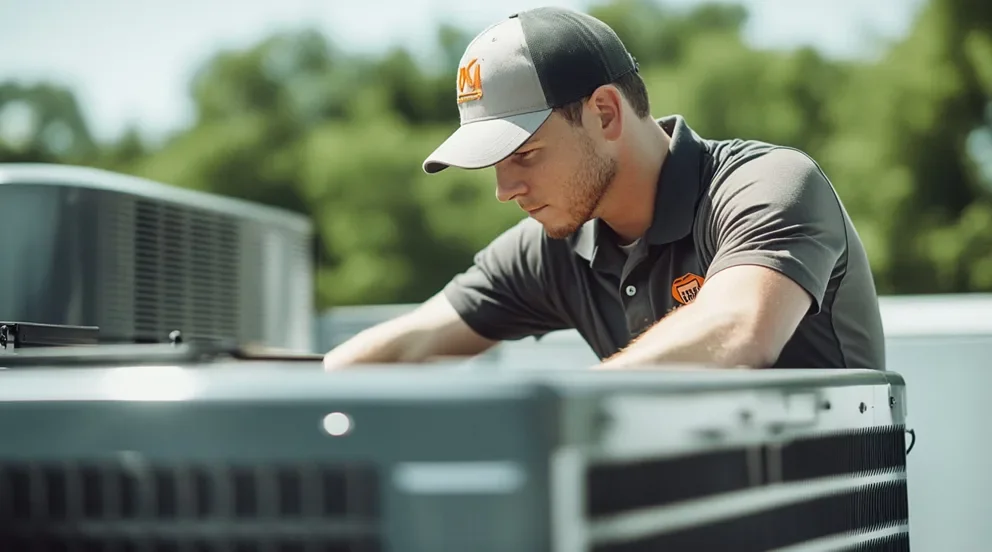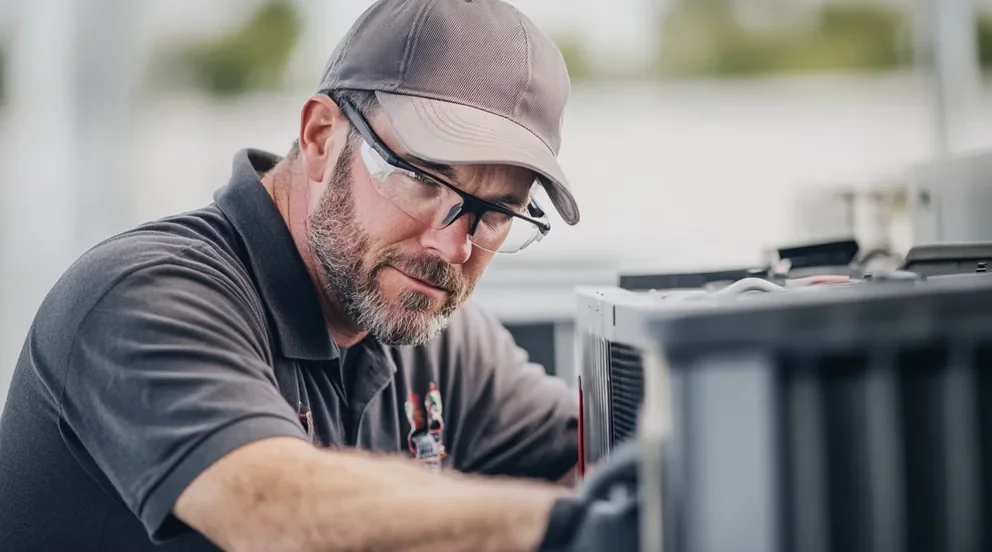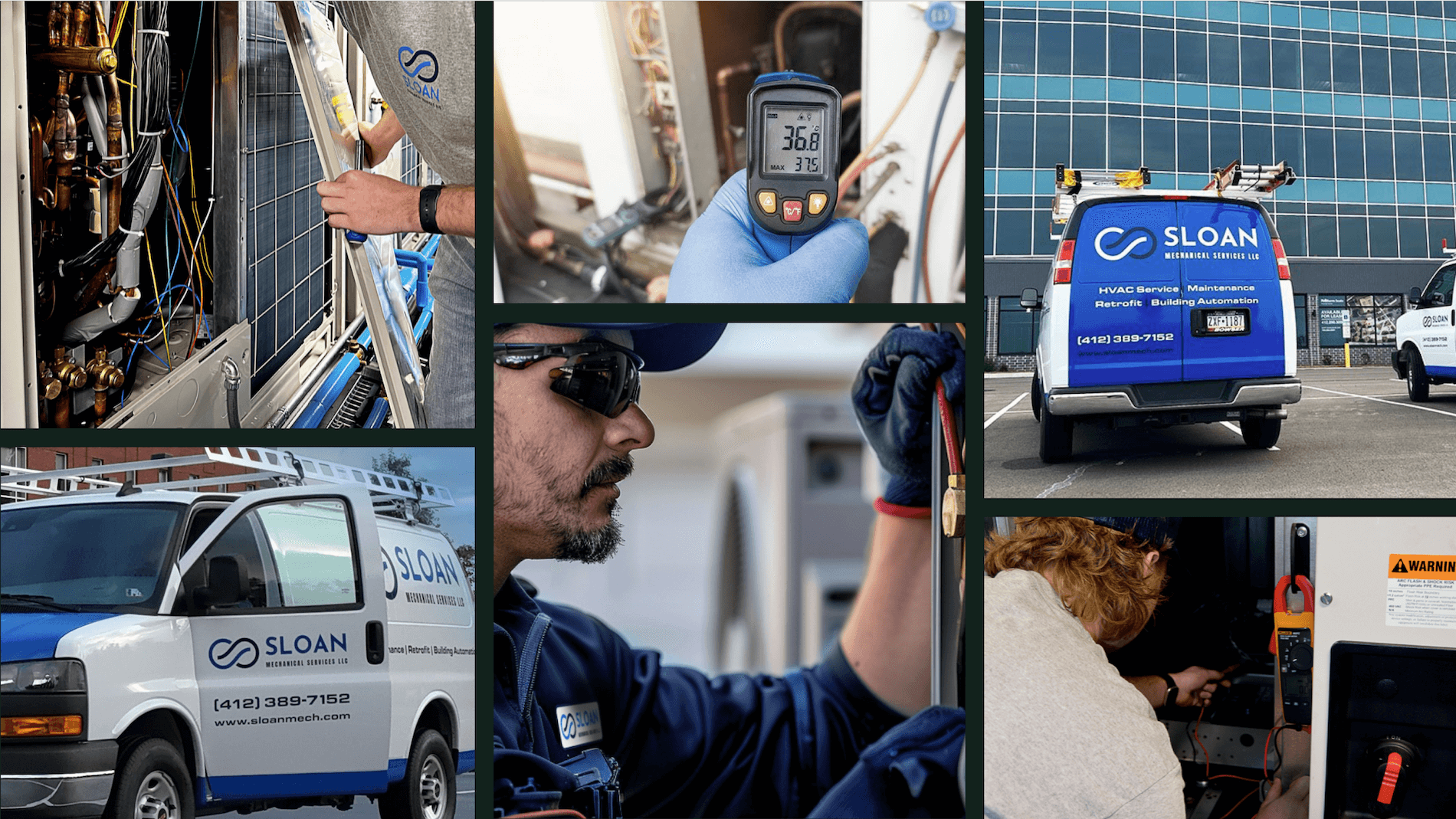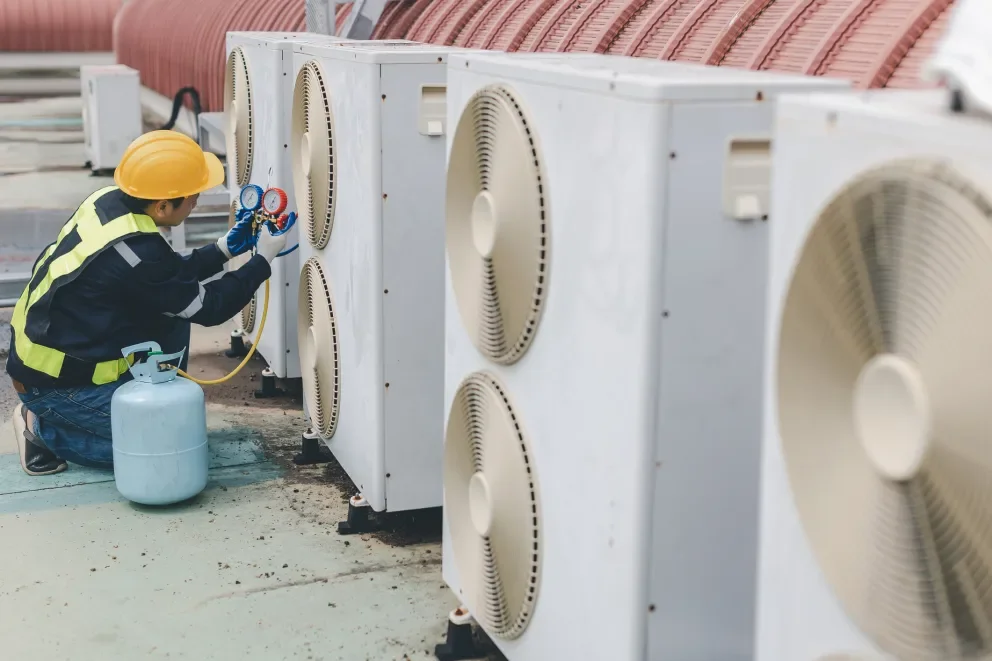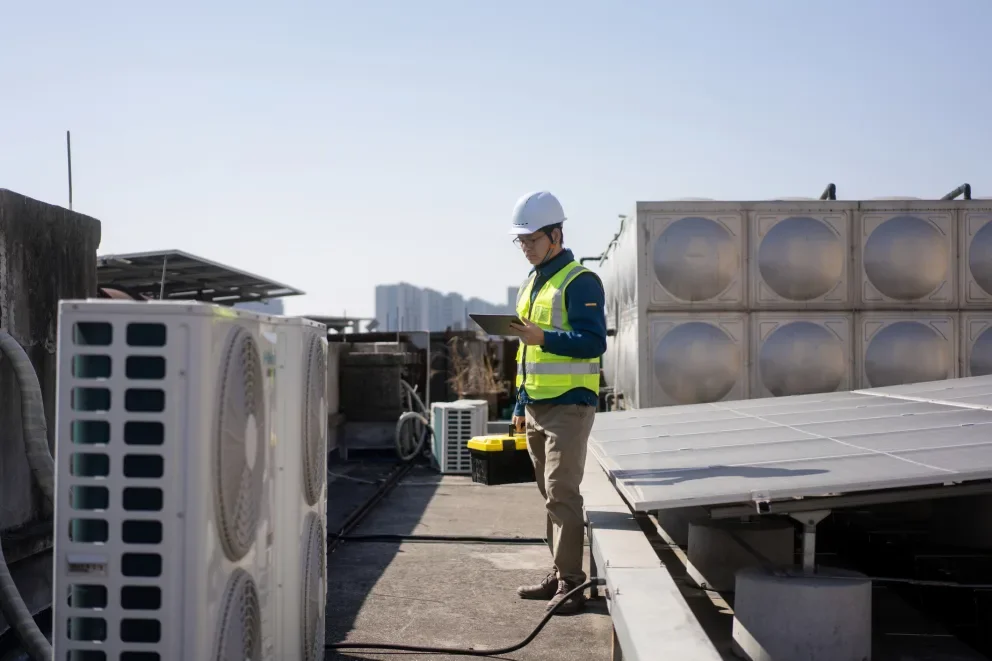When HVAC systems fail in commercial buildings, it’s not just an inconvenience—it’s lost revenue, unhappy tenants, and a pile of urgent service calls. That’s why having a rock-solid system to manage your service agreements is a game-changer. It keeps systems in check, cash flow steady, and clients locked in for the long haul. But not all agreements deliver the same value. If you’re in the HVAC industry, knowing what to include, how to structure contracts, and where to find the best templates can set your business up for long-term success.
- What is a commercial HVAC service agreement contract?
- 7 benefits of commercial HVAC service contracts
- What to include in a commercial HVAC service agreement contract
- 8 best commercial HVAC service agreement templates
Let’s start with the foundation—what a commercial HVAC service agreement really is and why it’s a must-have.
What is a commercial HVAC service agreement contract?
A commercial HVAC service agreement is a contract between an HVAC business and a client that outlines scheduled maintenance, repairs, and priority service terms. It helps businesses prevent costly breakdowns, extend equipment life, and ensure consistent climate control in commercial properties.
A well-structured agreement protects both parties—giving clients peace of mind and securing steady work for HVAC contractors. These contracts typically cover routine inspections, system tune-ups, and emergency service options, ensuring HVAC systems operate efficiently year-round.
Common HVAC services included in a maintenance contract
A commercial HVAC service agreement is a roadmap for keeping systems running without interruptions. The exact services included will depend on the contract, but most agreements offer a mix of preventative maintenance, system upgrades, and emergency response.
- Inspections and testing: Routine system checks to catch issues before they turn into costly repairs.
- Tune-ups: Adjustments and calibrations that optimize system performance and energy efficiency.
- Purchasing and installation: Assistance with upgrading or replacing HVAC equipment as needed.
- Premium service: Priority scheduling and extended warranties for added protection.
- Emergency services: 24/7 support for unexpected breakdowns to minimize downtime.
Service agreements provide peace of mind and smooth daily operations by eliminating unexpected breakdowns and extending equipment lifespans. Additionally, routine maintenance checks identify potential issues before they become major problems, preventing costly repairs, replacements, and business disruptions while creating a comfortable and productive environment.
Now that we’ve covered what’s included, let’s break down the key advantages of having a commercial HVAC service contract in place.
7 benefits of commercial HVAC service contracts
For HVAC contractors and field service techs, every day is a mix of planned maintenance and unexpected service calls. Without a solid HVAC service agreement, clients wait until something breaks, leaving your team scrambling with last-minute repairs. A well-structured contract ensures steady work, reliable income, and fewer emergencies. Here’s how these agreements keep your business running smoothly.
1. Predictable revenue stream
With a commercial HVAC contract, cash flow isn’t left to chance. Instead of waiting for unpredictable repair calls, service agreements provide steady, recurring income. This stability allows you to budget for payroll, parts, and business growth. Consider a commercial HVAC company that used to experience massive slowdowns during the winter months, forcing them to cut technician hours. After securing HVAC maintenance agreements with office buildings and retail spaces, they ensured year-round scheduled work, eliminating revenue gaps and keeping their best techs on staff.
2. Reduced emergency repairs
Routine maintenance prevents system failures, keeping clients happy and reducing costly emergency calls. A contract for HVAC service agreements includes scheduled tune-ups that catch small issues before they escalate into expensive breakdowns. Take the case of a hotel that had its HVAC system fail in the middle of peak tourist season, leaving guests frustrated and rooms empty. Had they signed an HVAC service agreement template, routine checkups would have caught the failing compressor long before it became an emergency—saving them revenue and reputation damage.
3. Stronger client relationships
Commercial clients value reliability. A service contract for HVAC businesses fosters trust, positioning your company as their go-to provider for long-term system health, not just one-off fixes. Think about a property management firm overseeing multiple commercial buildings. With no formal agreement, they bounced between HVAC vendors whenever an issue arose. But after partnering with a contractor using HVAC service agreement software, they secured consistent service, faster response times, and a reliable HVAC partner for all their properties.
4. Increased efficiency for scheduling & dispatching
A structured contract allows you to plan ahead, optimizing technician schedules rather than reacting to last-minute calls. With commercial HVAC service agreements, you can group maintenance visits by location, reducing drive time and increasing job efficiency. Imagine a dispatch team constantly scrambling to rearrange schedules due to urgent service requests. After implementing HVAC maintenance agreements, they streamlined scheduling by grouping clients based on location and system needs, cutting fuel costs and allowing techs to complete more jobs each day.
5. Higher profit margins on services
Preventative maintenance agreements let you upsell premium services like filter replacements, system upgrades, and energy audits, boosting overall revenue. Commercial HVAC bid templates help standardize pricing so clients see the value in long-term service. Consider, for example, an HVAC contractor struggling with inconsistent pricing, often underquoting jobs just to stay competitive. Once they started using a commercial HVAC bid template, they locked in pricing across all contracts, ensuring predictable profits while helping clients budget accurately for HVAC services.
6. Competitive advantage in the market
Many commercial clients expect service agreements as part of their vendor contracts. Offering HVAC service agreements makes your business stand out against competitors who only handle reactive repairs. For instance, a manufacturing plant was reviewing multiple HVAC proposals for a long-term vendor. One company stood out by presenting a professional, itemized service plan using commercial HVAC estimating software, making it clear what services were included and why regular maintenance would save them money long term. That extra layer of professionalism won them the contract.
7. Extended equipment lifespan for clients
A well-maintained system lasts longer, reducing costly replacements and improving energy efficiency. Commercial HVAC service contracts prove their value by extending the life of expensive units, keeping clients invested in long-term agreements. Take a commercial office building that previously replaced rooftop units every seven years due to neglect. Once they signed an HVAC service agreement, quarterly tune-ups helped keep their systems running efficiently for over a decade, cutting replacement costs in half and boosting energy savings.
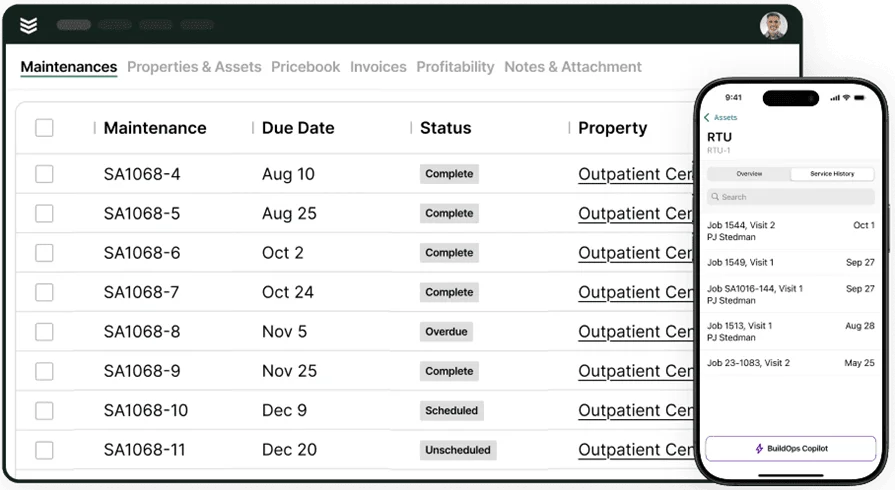
Check out our service agreement tool
We help commercial HVAC teams secure more jobs and manage them to closeout.
What to include in a commercial HVAC service agreement contract
A well-structured commercial HVAC service agreement sets clear expectations, ensuring both the contractor and the client understand their responsibilities. Without defined terms, miscommunication can lead to disputes, missed services, or unexpected costs. Whether you’re drafting a new agreement or refining an existing one, these key components provide the foundation for a smooth, professional partnership.
- Scope of services: Defines what’s covered, from routine maintenance and inspections to emergency repairs and system upgrades. Without this, clients may assume services are included when they’re not.
- Service schedule: Outlines how often maintenance visits occur—monthly, quarterly, or annually—ensuring systems stay in peak condition.
- Response time commitments: Specifies how quickly a technician will be dispatched for emergency calls, helping clients plan accordingly.
- Parts and labor coverage: Clarifies which repairs and replacements are included in the contract to prevent unexpected expenses.
- Pricing and payment terms: Details the contract’s cost structure, including billing frequency, payment methods, and penalties for late payments.
- Warranty and liability clauses: Protects both parties by outlining the contractor’s responsibility for workmanship and the client’s role in equipment upkeep.
- Termination policy: Establishes how either party can cancel the contract, including notice periods and any applicable fees.
- Exclusions and limitations: Lists what’s not covered, such as damage from neglect, unauthorized modifications, or natural disasters.
- Client responsibilities: Defines the client’s role, such as granting access to equipment and reporting issues promptly.
- Renewal terms: Specifies how contracts are extended, whether automatically or through a renegotiation process.
Having these elements in place ensures a commercial HVAC service agreement is comprehensive, reducing disputes and keeping both parties on the same page.
Now, let’s explore some of the best HVAC service agreement templates available, helping you streamline your contract creation process.
8 best commercial HVAC service agreement templates
Finding the right HVAC service agreement template can be a hassle. Some contracts are too basic, leaving out critical details, while others are overloaded with legal jargon that slows down the process. The right template should strike a balance—covering everything your business needs while being easy to implement. Below, we’ve rounded up the best options, including this full list of HVAC contract templates that covers both commercial and residential agreements.
1. BuildOps
BuildOps is built for commercial HVAC businesses that need more than a basic contract template. This all-in-one platform handles service agreements, scheduling, invoicing, and technician dispatch—all in one place. Instead of juggling spreadsheets and paper contracts, HVAC contractors can automate everything from routine maintenance reminders to renewal tracking, making contract management a breeze.
Template Format: Software
Cost: Per-month, per-user annual contract
Most Useful For: Commercial
If you’re looking for a smarter way to handle HVAC service agreements, check out the full feature set here: BuildOps’ commercial service agreements software.
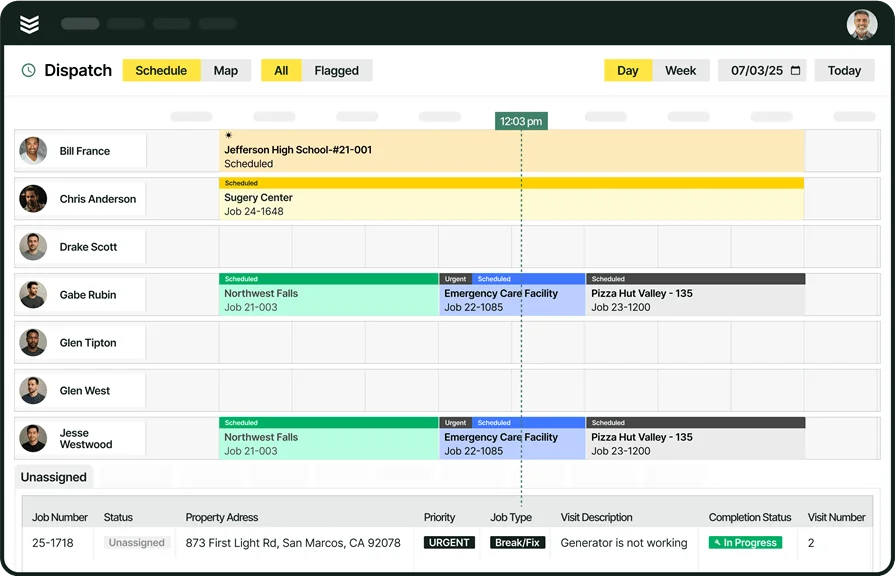
See BuildOps in action
Find a smarter way to handle HVAC service agreements and boost profitability.
2. LegalZoom
LegalZoom provides a legally vetted HVAC service agreement template designed for businesses that need a contract with clear terms and legal protection. While not HVAC-specific, it offers customizable options that can be tailored to suit service-based businesses.
Template format: Template
Cost: Pricing varies based on customization and legal review options.
Most useful for: Commercial, residential, and small businesses
If you need a contract with solid legal backing, this HVAC service agreement template makes it easy to customize terms while ensuring compliance.
3. Jotform
Jotform offers a user-friendly HVAC maintenance agreement template with customizable fields, allowing contractors to create professional, fillable contracts in minutes. Its drag-and-drop editor makes it ideal for businesses that need a quick and flexible solution.
Template format: Template
Cost: Free with limited access; premium plans unlock more features.
Most useful for: Commercial, residential, and small businesses
For businesses that need a quick, fillable HVAC contract, this template from Jotform helps you create professional agreements without the hassle.
4. HVAC Business Solutions
HVAC Business Solutions provides service contract software built specifically for HVAC companies, helping them automate agreements, track contract renewals, and manage customer records. It’s designed to integrate seamlessly with other business tools for a more efficient workflow.
Template format: Software
Cost: Subscription-based pricing, varies by plan.
Most useful for: Commercial & Residential
Looking for HVAC service contract software that does more than just create agreements? Check out HVAC Business Solutions for a platform that tracks contracts, automates billing, and simplifies renewals.
5. ServiceTitan
ServiceTitan combines HVAC service agreement templates with robust business management tools, making it easy to create, track, and automate maintenance contracts. It’s best suited for growing HVAC businesses looking for an all-in-one solution.
Template format: Software & template
Cost: Custom pricing based on business size and needs.
Most useful for: Commercial
Need a contract system that integrates with your entire operation? ServiceTitan’s HVAC agreement tools help you manage service plans, automate payments, and improve customer retention. You can also compare ServiceTitan vs BuildOps features directly right here.
6. ZenTrades
ZenTrades is a powerful HVAC contract management platform that helps commercial HVAC businesses create agreements, monitor service schedules, and streamline invoicing. It’s designed for contractors who need a complete workflow solution.
Template format: Software
Cost: Subscription-based with scalable pricing.
Most useful for: Commercial
A strong service contract is just the start—ZenTrades helps HVAC businesses build agreements, track jobs, and manage field operations all in one platform.
7. FieldPulse
FieldPulse offers an intuitive HVAC maintenance agreement tool that simplifies contract creation, automates scheduling, and improves customer management. It’s a great option for contractors looking to convert one-time service calls into long-term maintenance clients.
Template format: Software
Cost: Monthly subscription with different pricing tiers.
Most useful for: Commercial, residential, and small businesses
Turn one-time jobs into long-term clients with FieldPulse’s HVAC maintenance agreements—a tool built to simplify contracts, automate scheduling, and keep revenue steady. Try taking a deeper look at FieldPulse vs BuildOps features in our head-to-head comparison.
8. Fieldpoint
Fieldpoint delivers HVAC service contract software that integrates contract management with dispatching, work orders, and invoicing. It’s built for HVAC businesses that need a seamless way to handle service agreements within their daily operations.
Template format: Software
Cost: Pricing varies based on features and business size.
Most useful for: Commercial, residential, and small businesses
Managing contracts alongside scheduling and invoicing? Fieldpoint’s service management software helps HVAC businesses streamline agreements while keeping everything connected in one place.
A commercial HVAC service agreement is more than a contract—it’s a strategic tool that keeps revenue predictable, minimizes emergency repairs, and builds lasting client relationships. A well-structured agreement helps HVAC businesses streamline operations, optimize technician schedules, and ensure customers receive consistent, high-quality service. Whether you prefer a basic template or an automated platform, having a reliable system in place makes contract management effortless
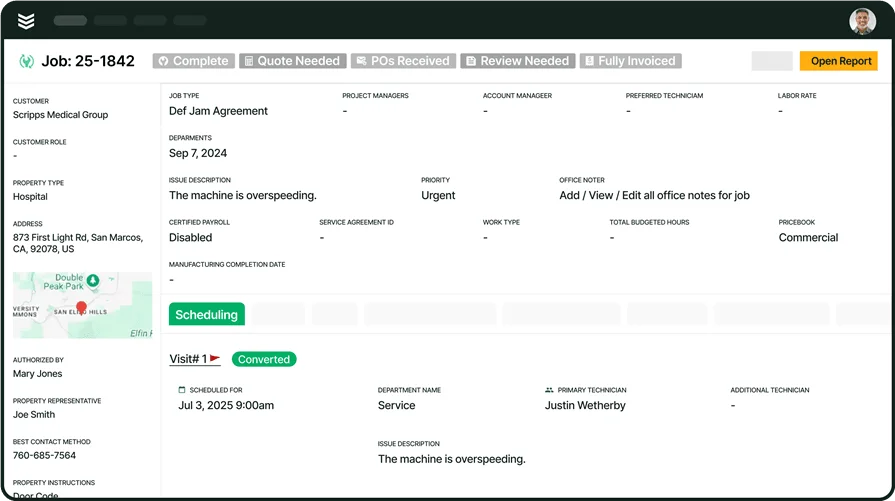
Take a closer look at BuildOps
We simplify service agreements so commercial HVAC teams can manage their schedule.
